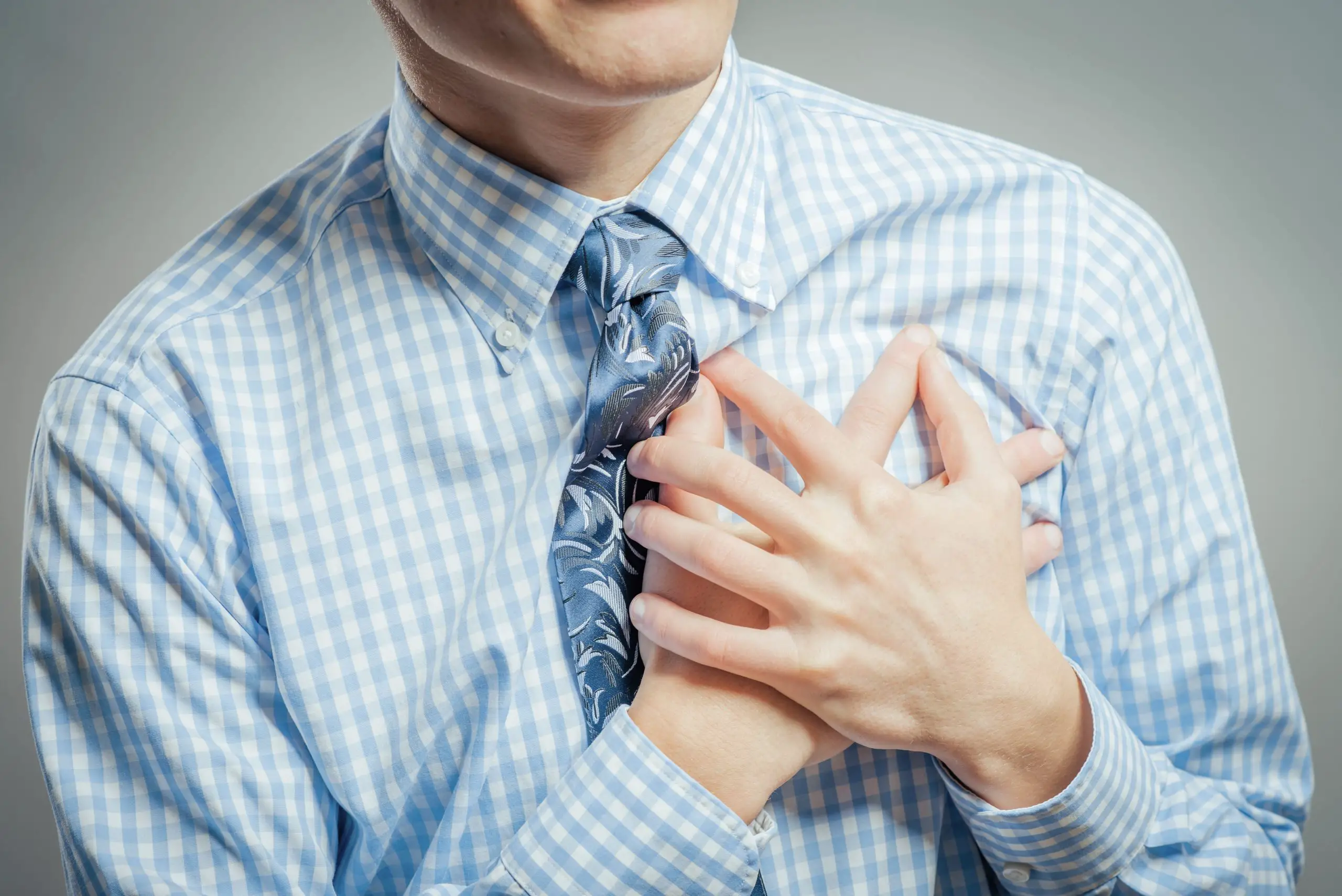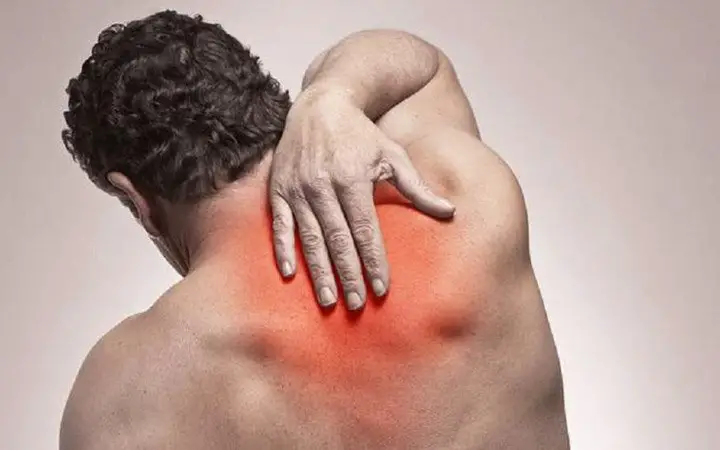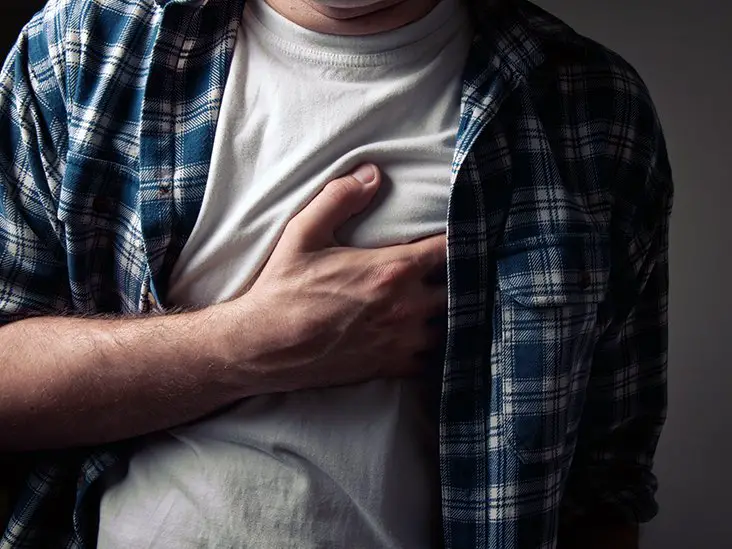The Real Cause Behind Upper Back Pain And Chest Tightness
Do you struggle with chronic upper back and neck pain? Is it difficult to hold good posture without discomfort? Perhaps you even have trouble sleeping at times because of the discomfort. Do you also feel tightness in your chest and shoulders?
If youre nodding your head yes to all of these questions, you may have a condition called upper crossed syndrome. While back pain in general certainly isnt uncommon, the upper crossed syndrome is a lesser-known condition that can greatly contribute to back pain, especially if its accompanied by tightness in the chest and shoulders. And, when left untreated, it only continues to progress to a worse state.
Dont worry: if you do fall into this category, the encouraging news is that most cases are completely treatable with the right diagnosis, patience, and consistent conservative care. Lets explore the causes behind this condition and tangible steps to take toward your healing.
How Chiropractic Can Help Keep Your Back Healthy
A sizable cause of the discomfort that comes along with upper crossed syndrome is muscle tightness in the upper back area. This excessive tightness combined with poor posture can easily cause your joints to become misaligned, leading to more inflammation, pressure, and discomfort. Chiropractic care can address these misalignments through the use of gentle adjustments of the spine. When combined with an ongoing rehabilitation plan, consistent chiropractic care can help give your body more support and speed your recovery process.
Additionally, your chiropractor can help ensure that there arent any missed diagnoses causing your pain. Your practitioner will be able to curtail treatment to each individual case, ensuring that you receive the best care for your unique needs.
Rid yourself of back pain for good. Get healthy now. Schedule an appointment online or call 732-1929.
This article is for informational purposes only and is not a substitute for in-person advice or care from a medical professional.
Musculoskeletal And Nerve Dysfunction
There are also certain benign medical conditions like musculoskeletal and nerve disorders which may cause burning pain in the chest and back. These disorders affect the nerves, cartilage, and muscles within the chest cavity causing the pain.
Costochondritis is one such condition which causes burning chest and back pain. This condition is caused by inflammation of the rib cartilage. When the nerves around the chest and back area get affected or inflamed then that may also cause burning chest and back pain.
Some of the common conditions that may affect the nerves of the chest and back are shingles or herpes zoster resulting in burning pain in the chest and back.
Also Read:
Also Check: Will Naproxen Help Back Pain
Can Back Problems Cause Chest Pain
Ask U.S. doctors your own question and get educational, text answers â it’s anonymous and free!
Ask U.S. doctors your own question and get educational, text answers â it’s anonymous and free!
HealthTap doctors are based in the U.S., board certified, and available by text or video.
What Are The Symptoms Of A Heart Attack

Some heart attacks are sudden and intense the movie heart attack, where no one doubts whats happening. But most heart attacks start slowly, with mild pain or discomfort. Often people affected arent sure whats wrong and wait too long before getting help. Here are signs that can mean a heart attack is happening:
Shortness of breath. May occur with or without chest discomfort.
Chest discomfort. Most heart attacks involve discomfort or heaviness in the chests centre that lasts more than a few minutes or that goes away and comes back. It can feel like uncomfortable pressure, squeezing, fullness or pain.
Discomfort in other areas of the upper body. Symptoms can include pain or discomfort in one or both arms, the back, neck, jaw or stomach.
Other signs include breaking out in nausea or vomiting, cold sweat, or dizziness/lightheadedness.
If you think you or someone with you is having a heart attack,
Dont wait longer than a few minutes before calling for help.
You May Like: Aleve And Back Pain
The Three Most Common Causes Of Noncardiac Chest Pain
Bone Or Muscle Problems
If your chest is painful and tender to touch, it may be caused by a strained muscle in your chest wall. This can be surprisingly painful, but with rest the pain should ease and the muscle will heal in time.
If you have pain, swelling and tenderness around your ribs, and the pain is made worse by lying down, breathing deeply, coughing or sneezing, you may have a condition called costochondritis.
This is caused by inflammation in the joints between the cartilage that joins the ribs to the breastbone . The symptoms often improve after a few weeks and may be relieved by painkillers.
You May Like: Is Aleve Good For Back Pain
Why Do I Feel Pain When I Cough
Some causes of chest and back pain get worse while coughing. This can happen with:
- pericarditis
In some cases, you may feel pain when you swallow.
Causes of chest and back pain that can cause pain while swallowing include pericarditis and aortic aneurysm, if the aneurysm is pressing on the esophagus.
What To Expect At Your Office Visit
Your provider may ask questions such as:
- Is the pain between the shoulder blades? Under the breast bone? Does the pain change location? Is it on one side only?
- How would you describe the pain?
- Does it begin suddenly? Does the pain occur at the same time each day?
- Does the pain get better or worse when you walk or change positions?
- Can you make the pain happen by pressing on a part of your chest?
- Is the pain getting worse? How long does the pain last?
- Does the pain go from your chest into your shoulder, arm, neck, jaw, or back?
- Is the pain worse when you are breathing deeply, coughing, eating, or bending?
- Is the pain worse when you are exercising? Is it better after you rest? Does it go away completely, or is there just less pain?
- Is the pain better after you take nitroglycerin medicine? After you eat or take antacids? After you belch?
- What other symptoms do you have?
The types of tests that are done depend on the cause of the pain, and what other medical problems or risk factors you have.
Also Check: Aleve Or Advil For Lower Back Pain
The Final Word On Back Pain And Heart Attacks
As mentioned earlier, back pain by itself is not a harbinger of a coming heart attack. You are more likely to experience back pain because of a herniated disc or muscle strain. However, women should be aware that they may feel subtler symptoms. If you are enduring back pain in conjunction with other heart attack symptoms, come see us at Phoenix Heart.
Take control of your cardiac health with Phoenix Heart. at one of our Arizona offices today.
You Might Also Enjoy…
When To Get Help For Chest Pain
You should call 999 for an ambulance immediately if you develop sudden severe chest pain, particularly if:
- the pain feels heavy, pressing or tight
- the pain lasts longer than 15 minutes
- the pain spreads to other parts of your body, such as your arms, back or jaw
- you also have other symptoms, such as breathlessness, nausea, sweating, or coughing up blood
- you are at risk of coronary heart disease for example, you smoke, are obese, or have high blood pressure, diabetes or high cholesterol
If the discomfort is only minor or has resolved, it may be more appropriate to either:
- speak to your GP
- call the service
Recommended Reading: Back Pain Cleveland Clinic
Other Common Causes Of Chest Pain
The symptoms of a heart attack are similar to other conditions, so your chest pain may have nothing to do with your heart.
Other common causes of chest pain include:
- Indigestion or stomach acid coming up the oesophagus . This common problem can be made worse by smoking, drinking alcohol or coffee, eating fatty foods and taking some drugs. You may feel this as a burning pain in the chest. It often goes away quickly after taking antacid or milk.
- Chest trauma .
- Blood clots in your lungs .
- Chest muscle strains these can be caused by vigorous exercise, physically active work, playing contact sport or lifting weights at the gym.
- Inflammation in the rib joints near the breastbone .
- Shingles or can cause chest pain before a rash forms.
Cardiac Pain That Isnt A Heart Attack

Cardiac pain, or angina, refers to discomfort in the chest because of something going on with the heart. The first thing a cardiologist will try to determine in a patient with cardiac pain is whether the pain is caused by clogged arteries.
Several conditions of the heart can cause cardiac pain but arent related to clogged arteries, including:
- Pericarditis: inflammation of the two thin layers of tissue that surround the heart
- Dissection: when the aorta splits and causes severe chest and back pain
- Myocarditis: inflammation of the heart muscle
- Cardiomyopathy: diseases of the heart muscle
Recommended Reading: Does Aleve Help Back Pain
What Causes A Heart Attack
To understand the connection between heart attacks and back pain, its best to know what causes a heart attack. A heart attack occurs when the flow of blood to the heart is severely reduced or blocked.
Blockages are caused by clots, which are buildups of plaque that eventually stop blood from flowing through the arteries that feed the heart, also known as the coronary arteries. Heart attacks are deadly not just because they stop blood flow, but because they damage or destroy the heart muscle. When the heart muscle is too damaged to pump regularly or at all, the body cannot function properly.
How To Hang On: Coping During A Pandemic
A poll conducted in mid-April 2020 by the Kaiser Family Foundation found that 56% of adults reported that worry and stress because of the pandemic has had a negative effect on their mental health.
Respondents reported adverse effects such as trouble sleeping, poor appetite or overeating, frequent headaches or stomachaches, difficulty in controlling their temper, or increasing alcohol/drug use, and worsening chronic conditions like diabetes or high blood pressure. This is up from 45% reporting that stress over coronavirus had negatively affected their mental health in a KFF poll conducted in late March 2020.9
Right now everybody has increased anxiety, whether youre healthy as a horse, whether you have a psychiatric illness, or not, says Dr. McCann.
Telemedicine can help by connecting people with their doctors, and video meeting apps provide a means to keep up a social life as we remain in our homes. More on how to access telemedicine.
Dr. McCann also suggests exercising together with friends via video chat to support social interaction, while Dr. Bhatia recommends practicing mindfulness to ease stress.
Symptoms that are related to anxiety/panic can improve with mindfulness-based breathing exercises, says Dr. Bhatia.10 More on this technique from Dr. Bhatia.
Read Also: Is There Medication For Stress
Don’t Miss: Aleve Lower Back Pain
When To Get Immediate Help
It is important to try to identify if the cause is serious or life threatening. The information below should not be used to self-diagnose your condition.
It should give you an idea of what is causing your chest pain and whether you need to get emergency help or see your GP. It does not include every possible cause, but describes the most common reasons for chest pain.
You should call 999 for an ambulance immediately if you develop sudden severe chest pain, particularly if:
- the pain is central or band-like and feels heavy, pressing or tight
- the pain lasts longer than 15 minutes
- the pain spreads to other parts of your body, such as your arms, back or jaw
- you are at risk of coronary heart disease for example, you smoke, are obese, or have high blood pressure, diabetes or high cholesterol
If you think you could be having a heart attack, call 999 immediately and ask for an ambulance. Do not worry if you have any doubts about whether it is a heart attack. Paramedics would prefer to be called out to find that an honest mistake has been made than to be called out when it is too late to save a person’s life.
If the discomfort is not sudden and severe, or has resolved, it may be more appropriate to see your GP. If your own GP surgery is closed, you should contact your local out of hours service if you are concerned and need advice as to whether you need assessment or treatment.
Functional Morbidity With Pd
Studies that have examined quality of life among patients with PD found substantial disability in a variety of psychosocial realms. Data from the ECA found that PD patients had significantly higher rates of perceived poor physical health, social disability, marital dysfunction, and financial dependency , as well as greater psychiatric comorbidity with elevated rates of attempted suicide. Furthermore, these impairments in perceived health and financial and occupational function were present even in patients with panic attacks but without PD. Further analysis of the ECA data found that, among patients with anxiety disorders, PD was associated with the highest rates of unemployment and financial dependence these effects were independent of comorbid depression. Investigations other than the ECA study have confirmed the findings of significant functional disability in patients with PD. A review by Edlund and Swann discussed the high social morbidity associated with PD, and Katon and associates, in 1995, found that both patients with PD and those with infrequent panic attacks had significantly greater social, family and vocational disability than did controls.
Don’t Miss: Is Motrin Good For Back Pain
Lung Conditions That Can Cause Burning Chest And Back:
Pneumonia: The most common condition of the lung which can cause burning chest pain and pressure is pneumonia. Pneumonia occurs when the airways get inflamed and swell causing constriction.
This leads to reduced supply of air to the lungs causing difficulty breathing along with burning chest and back pain. Pneumonia is normally a viral infection, although certain forms of bacteria can also cause pneumonia.
Pleuritis: This is a lung condition in which there is inflammation of the sac which encompasses each lung. This condition can also cause burning pain in the chest and back. This pain tends to get worse with coughing or sneezing.
Pulmonary Embolism: This is yet another lung disorder which causes burning chest and back pain. Additionally, the individual may experience difficulty breathing and persistent cough. Pulmonary embolism is potentially a serious condition and requires emergent medical treatment. A blood clot in the legs called deep vein thrombosis which breaks free and gets lodged in the lungs is the primary cause of a Pulmonary Embolism.
Chest And Back Pain At The Same Height
Chest and back pain at the same height, such as the one that occurs between the shoulder blades, specifically in the upper back and chest, can have many causes, ranging from a muscle strain, which is the cause more common, even an organic problem.
However, the main cause of chest and back pain at the same height is stress, anxiety and being subjected to depressive symptoms . These alterations contribute to the appearance of anxiety, nervousness, tightness and pain in both the upper back and the chest.
These discomforts can be controlled as the necessary treatment to manage stress and anxiety is carried out.
Don’t Miss: Advil For Back Pain Dosage
Chest And Back Pain: Treatment
Treatment of chest and back pain depends on what is causing the symptoms. The specialist doctor will indicate the therapy to be followed in each case according to the symptoms that the patient presents.
Medications indicated in case of chest and back pain can be:
- Aspirin : in cases where the pain is suspected to be due to heart causes.
- Arterial relaxants such as nitroglycerin, used to relax the arteries of the heart
- Anticoagulants : in those cases in which the presence of a clot in an artery is detected, these drugs prevent the formation of new clots.
- Thrombolytics : if it is a heart attack, the indication will be to dissolve the clot using these drugs.
- Antacids : When chest pain is caused by stomach acid, these drugs are the first choice.
- Antidepressants : they will be indicated when in the presence of panic attacks, in this way, symptoms will be controlled, especially chest and back pain.
- In cases where bone or muscle problems are involved, the indications will be analgesics or muscle relaxants indicated in their different oral, intramuscular or topical presentations.
Depending on the cause, a surgical procedure such as:
The presence of chest and back pain is a sign that deserves medical attention to know the exact cause and initiate the appropriate treatment.
If you want to read more articles similar to Chest and back pain: causes and symptoms , we recommend that you enter our Lung and respiratory tract category .
When Should I Call Triple Zero And Ask For An Ambulance

If you have any of the symptoms below, call triple zero immediately and ask for an ambulance. If calling triple zero does not work on your mobile phone, try calling 112.
- your chest pain is severe, or worsening, or has lasted longer than 10 minutes
- your chest pain feels heavy, crushing or tight
- you have other symptoms, such as breathlessness, nausea, dizziness or a cold sweat
- you also feel the pain in your jaw or down your left arm
Also Check: Aleve Good For Back Pain